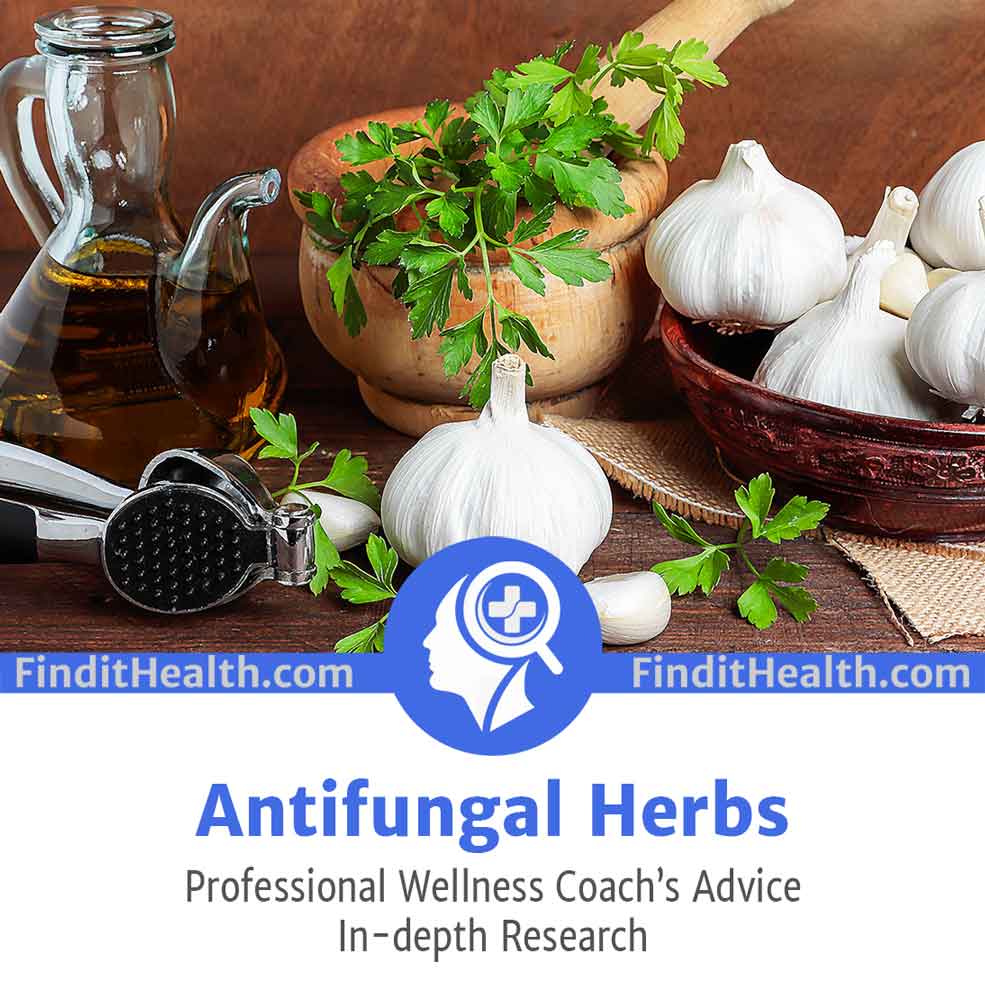
As the wellness team leader at Find It Health, my commitment lies in uncovering holistic remedies to enhance your well-being and guide you toward a healthier life. In this pursuit, researchers have explored natural antifungals crucial for our health, extending benefits beyond the mere management of fungal infections like athlete’s foot and oral thrush.
These remarkable herbal drugs possess stress-relieving properties, allowing individuals to not only address physical concerns but also cultivate inner tranquility. By incorporating antifungal therapy into your wellness routine, you embark on a journey towards comprehensive vitality, where the power of nature nurtures both body and mind.
Best Antifungal Herbs
Here are some natural antifungals recognized for their potential benefits:
Form: Fresh cloves, garlic oil, garlic extract, supplements
Mechanism of action: Garlic’s antifungal activity is attributed to allicin, a bioactive compound that destroys fungal cell membranes. Its exact mechanism of action inhibits the growth of C. albicans, and its anticandidal activity has been thoroughly investigated in clinical trials.
- Oregano (Origanum vulgare)
Form: Oregano oil, supplements
Mechanism of action: Its active compounds, carvacrol, and thymol, disrupt fungal cell membranes that render them susceptible to damage. This interference inhibits fungal cell growth and proliferation, showcasing oregano’s potential as an antifungal drug.
- Tea Tree (Melaleuca alternifolia)
Form: Tea tree oil, topical products
Mechanism of action: Tea tree oil targets fungal cell membranes and inhibits biofilm formation, thereby limiting the growth and spread of fungal species. Clinical trials have highlighted its anticandidal activity in the treatment of skin-related fungal issues, such as athlete’s foot and jock itch. Additionally, its aqueous extract shows promise as an antimicrobial agent.
- Clove (Syzygium aromaticum)
Form: Clove oil, topical applications, essential oil
Mechanism of action: Eugenol in clove oil breaks fungal cell membranes and inhibits biofilm formation. This antifungal compound suggests the potential in addressing a range of fungal strains, providing an additional avenue for combinatorial drug approaches and complementary and alternative medicine.
- Cinnamon (Cinnamomum verum)
Form: Cinnamon bark oil, supplements
Mechanism of action: Cinnamaldehyde, a major component in cinnamon, exerts its influence by weakening fungal cell walls. Such insights hold promise for advancing antifungal therapies within the context of complementary and alternative medicine.
- Thyme (Thymus vulgaris)
Form: Thyme essential oil, supplements
Mechanism of action: Thymol, an active component with potent antifungal effects, disrupts fungal biofilms. This unique mode of action emphasizes thyme’s potential as an effective antifungal agent in complementary and alternative medicine.
- Goldenseal (Hydrastis canadensis)
Form: Goldenseal extract, supplements
Mechanism of action: Goldenseal extract, enriched with the active component Berberine, exerts its influence by suspending fungal enzymatic activity. This mode of action presents a multi-pronged strategy to effectively combat fungal infections stemming from various strains.
- Pau d’Arco (Tabebuia avellanedae)
Form: Pau d’Arco extract, supplements
Mechanism of action: Pau d’Arco’s major component, Lapachol, exerts its antifungal effects by breaking fungal cell membranes. This presents its potential to specifically target fungal strains that exhibit resistance, while also addressing the formation of fungal biofilms.
- Neem (Azadirachta indica)
Form: Neem extracts, neem oil, supplements
Mechanism of action: The bioactive compounds found in neem extract stop fungal enzymatic activity, particularly influencing protein products. Enriched by its historical use in traditional medicine, neem further enhances the scope of natural antifungals in complementary and alternative medicine.
- Black Walnut (Juglans nigra)
Form: Black walnut hull extracts, supplements
Mechanism of action: Active compounds like juglone and tannins disrupt fungal cell walls, hindering the growth and survival of fungal cells. This action highlights their potential as antifungal agents in combating infections such as Jock itch and athlete’s foot.
These herbal medicines, supported by research and their various mechanisms of action, offer promising avenues for developing antifungal therapies that extend beyond conventional treatments. As they progress through clinical trials, their potential to serve as alternatives to standard antifungal drugs becomes increasingly evident within the context of complementary and alternative medicine.
SUBSCRIBE for FREE STRESS MANAGEMENT TECHNIQUES from our EXPERT COACHES!
Most Powerful Antifungal Herbs
The Mighty Trio: Unveiling Nature’s Antifungal Arsenal
Garlic, revered for both its culinary and medicinal attributes, boasts a formidable secret weapon: allicin. This potent compound has been shown to exhibit remarkable antifungal prowess, making garlic a time-honored ally in the battle against fungal strains.
Oregano oil, a fragrant extract derived from the aromatic oregano plant, showcases an impressive duo: carvacrol and thymol.
These dynamic components have demonstrated their ability to combat fungal growth, elevating oregano oil to a prominent role in natural antifungal therapy.
Tea tree oil, derived from the leaves of the Australian Melaleuca alternifolia tree, brings a multifaceted approach to the table. Its diverse effects contribute to its reputation as an efficacious agent against various fungal strains.
A Tailored Approach: Customizing Antifungal Strategies
While the arsenal of natural antifungals is undeniably impressive, selecting the optimal remedy demands a nuanced understanding of individual preferences and specific fungal conditions. The journey toward fungal management becomes a personalized path, where considerations of lifestyle, sensitivities, and severity play a pivotal role.
The versatility of these natural remedies opens a world of possibilities, allowing individuals to tailor their approach according to their unique circumstances.
Guided Steps: The Role of Healthcare Professionals
Navigating the landscape of natural antifungals can be intricate, warranting expert guidance. Healthcare professionals emerge as essential partners in this journey, providing invaluable insights that bridge the gap between traditional remedies and evidence-based care. Their expertise ensures that the chosen interventions align seamlessly with comprehensive fungal management strategies.
From dosage recommendations to potential interactions, healthcare professionals empower individuals to make informed decisions that prioritize both well-being and efficacy.
SUBSCRIBE for FREE STRESS MANAGEMENT TECHNIQUES from our EXPERT COACHES!
Using Natural Antifungal Foods In Addition
In addition to herbal drugs, utilizing the power of natural antifungal foods further enhances your approach to overall wellness. Natural antifungal foods contain compounds that have been shown to inhibit the growth of different fungal species. Examples include onion, turmeric, cranberries, yogurt, raw honey, and citrus fruits.
Incorporating foods known for their inherent antifungal activity can optimize your strategy for managing fungal infections and promoting overall health. While herbs offer specific advantages, these nutrient-rich choices provide a wider range of support. However, consulting a healthcare professional before implementing significant dietary changes is recommended as individual responses may differ.
The synergistic effect of combining herbal drugs and natural antifungal foods presents a holistic strategy for maintaining well-being and addressing fungal concerns. As you navigate this path, remember that each choice contributes to a comprehensive approach to health.
Frequently Asked Questions
What natural herb is antifungal?
Well-known herbs recognized for their antifungal compounds:
- Garlic (Allium sativum)
- Oregano (Origanum vulgare)
- Tea tree (Melaleuca alternifolia)
- Clove (Syzygium aromaticum)
- Cinnamon (Cinnamomum verum)
- Thyme (Thymus vulgaris)
- Goldenseal (Hydrastis canadensis)
- Pau d’Arco (Tabebuia avellanedae)
- Neem (Azadirachta indica)
- Black walnut (Juglans nigra)
What is the best natural antifungal remedy?
Garlic (Allium sativum) is highly renowned for its potent antifungal activity attributed to its broad-spectrum effects and well-documented allicin content. Allicin is known as a strong antimicrobial agent with notable antifungal activity and has been extensively studied in clinical trials for its potential therapeutic applications against various fungal strains.
It is important to note that while garlic is considered powerful, the effectiveness of any herbal medicine can vary based on different factors. Consultation with a healthcare professional is advisable before using any herbal remedy for medicinal purposes.
What naturally kills fungus in human body?
The immune system detects and combats fungal strains by activating immune cells that target and destroy them. Inflammation is triggered to neutralize the threat afterward. However, fungal infections can occur if the immune response is weak.
Medical intervention, antifungal drugs, and natural products can aid the immune system. Maintaining a healthy immune system through proper nutrition, regular exercise, and adequate sleep enhances its ability to naturally fight fungal infections.
What kills the harmful fungus in the body?
Antifungal therapy is the primary approach for eradicating harmful fungi in the body. This includes the utilization of combinatorial drug approaches such as antimycotic drugs and herbal extracts with potent antifungal compounds. This specialized treatment results in a synergistic effect that counteracts fungal growth and restores balance by disrupting their growth mechanisms, inhibiting biofilm formation, and interfering with crucial enzymatic activities.
Antifungal agents have been developed through clinical trials and research, specifically targeting fungal strains such as C. albicans, the culprit behind prevalent infections like jock itch, athlete’s foot, and systemic fungal diseases. Supported by the Current Opinion in Microbiology and other medical research, its multifaceted mode of action emphasizes the effectiveness of antifungal therapy in neutralizing fungal threats and facilitating the restoration of health.
Conclusion
In the ever-evolving landscape of health and wellness, the potency of antifungal herbs shines brightly as a natural force against fungal invaders. Professionals from Find It Health have researched various herbal options, and have uncovered their remarkable ability to combat infections, enhance immunity, and support your overall well-being.
From the rich tradition of herbal medicine to the cutting-edge insights of modern research, these potent plants have stood the test of time and scrutiny. By harnessing the power of antifungal herbs, we empower ourselves with a proactive approach to health, embracing nature’s remedies to fend off fungal problems. Let the knowledge of these botanical warriors be a steadfast ally in your pursuit of a healthier, more resilient life.


